Theater 2015-16: Northlight swings its beacon toward gay community and family redefined
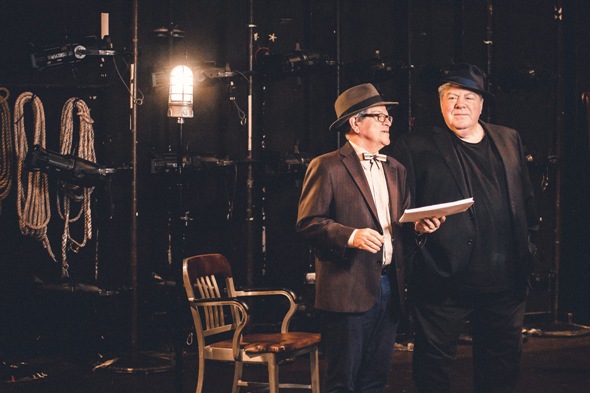 Ninth in a series of season previews: Back-to-back world premieres frame company’s wide scope, from poignant comedy “Funnyman” set on post-vaudeville stage to current LGBT issues in Chicago.
Ninth in a series of season previews: Back-to-back world premieres frame company’s wide scope, from poignant comedy “Funnyman” set on post-vaudeville stage to current LGBT issues in Chicago.
By Lawrence B. Johnson and Nancy Malitz
Northlight Theatre’s artistic director BJ Jones hasn’t exactly stitched a thematic banner for the 2015-16 season, but the recurring message of tolerance and understanding in our changing times is clear enough.
After a comedic opening fanfare, the world premiere of Bruce Graham’s “Funnyman,” which draws on the lives of comedians Bert Lahr, Buster Keaton, Sid Caesar and Milton Berle, the Northlight season is dominated by serious social reflection – even when it’s cast in very funny terms.
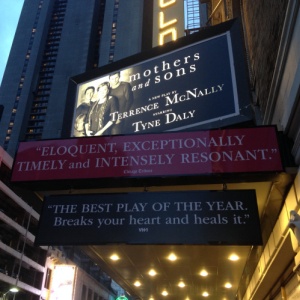 Instantly setting the tone is the world premiere of Philip Dawkins’ “Charm,” based on the work of Gloria Allen, a Chicago transgender African-American woman who established a social behavior class – or charm school – at The Center on Halsted to encourage more a becoming appearance and a more respectful tone in the community of LGBTQI (lesbian, gay, bisexual, transgender, queer, intersexed )youth who lack parental support and are often homeless.
Instantly setting the tone is the world premiere of Philip Dawkins’ “Charm,” based on the work of Gloria Allen, a Chicago transgender African-American woman who established a social behavior class – or charm school – at The Center on Halsted to encourage more a becoming appearance and a more respectful tone in the community of LGBTQI (lesbian, gay, bisexual, transgender, queer, intersexed )youth who lack parental support and are often homeless.
Terrence McNally’s “Mothers and Sons” deals with the enduring grief of a woman whose son has died of AIDS-related causes and who suddenly finds herself face-to-face with the happy, loving life the young man had sought. Then there’s an American classic, the prototype of plays about non-traditional families – “You Can’t Take It With You” by Moss Hart and George S. Kaufman, about a wacky clan barely contained under one roof, but forging ahead together through the tough years of the Depression.
“The notion of the nuclear family and how it has changed is at the heart of our season,” says Jones. “The world is having to readjust its vision of what we regard as family. It’s moving so fast, and it’s a conversation we want to have with our audience.”
The 2015-16 season in brief:
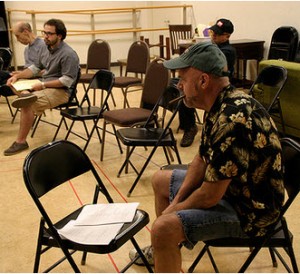 “Funnyman” by Bruce Graham (World premiere, Sept.18-Oct. 25): It’s 1959, and fading vaudeville comic Chick Sherman, along with his long-suffering agent, is trying to revive his career with a role in an avant-garde off-Broadway play. While his grown daughter searches for answers from her absentee showbiz father, a lifetime of private and professional struggles rise to the surface, cracking the polished public persona of the world’s favorite former funny man. “The lead character, Chick, is not unlike Bert Lahr and Buster Keaton, who both revitalized their careers by doing commercials,” says Jones. “The plot is twofold, about Chick’s relationship with his daughter and this great comedian’s decision to do a high-brow, Off-Broadway show – just as Lahr did ‘Waiting for Godot.’”
“Funnyman” by Bruce Graham (World premiere, Sept.18-Oct. 25): It’s 1959, and fading vaudeville comic Chick Sherman, along with his long-suffering agent, is trying to revive his career with a role in an avant-garde off-Broadway play. While his grown daughter searches for answers from her absentee showbiz father, a lifetime of private and professional struggles rise to the surface, cracking the polished public persona of the world’s favorite former funny man. “The lead character, Chick, is not unlike Bert Lahr and Buster Keaton, who both revitalized their careers by doing commercials,” says Jones. “The plot is twofold, about Chick’s relationship with his daughter and this great comedian’s decision to do a high-brow, Off-Broadway show – just as Lahr did ‘Waiting for Godot.’” “Charm” by Philip Dawkins (World premiere, presented at the Steppenwolf Garage Theatre, 1624 N. Halsted, Oct. 21-Nov. 8): Inspired by the true story of Gloria Allen and her work at The Center on Halsted, “Charm” depicts an etiquette class taught by Mama Darleena Andrews, an African-American transgender woman, to help reinforce self-esteem with the LGBTQI community. Despite her students’ daily battles with identity, poverty and prejudice, Mama’s powerful love and unapologetic attitude ultimately help her pupils find a new way to respect each other and to redefine what “having charm” means. “It’s part of our mission at Northlight to increase mutual understanding and compassion,” says Jones, “and ‘Charm’ could be the poster play for our mission. It’s about issues that all of us who are not part of the LGBTQI community need to familiarize ourselves with. We’re doing it the Steppenwolf Garage because it’s a storefront kind of piece.”
“Charm” by Philip Dawkins (World premiere, presented at the Steppenwolf Garage Theatre, 1624 N. Halsted, Oct. 21-Nov. 8): Inspired by the true story of Gloria Allen and her work at The Center on Halsted, “Charm” depicts an etiquette class taught by Mama Darleena Andrews, an African-American transgender woman, to help reinforce self-esteem with the LGBTQI community. Despite her students’ daily battles with identity, poverty and prejudice, Mama’s powerful love and unapologetic attitude ultimately help her pupils find a new way to respect each other and to redefine what “having charm” means. “It’s part of our mission at Northlight to increase mutual understanding and compassion,” says Jones, “and ‘Charm’ could be the poster play for our mission. It’s about issues that all of us who are not part of the LGBTQI community need to familiarize ourselves with. We’re doing it the Steppenwolf Garage because it’s a storefront kind of piece.”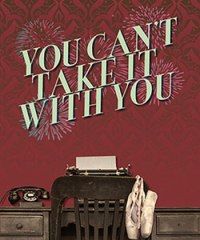 “You Can’t Take It With You” by Moss Hart and George S. Kaufman, Nov. 13-Dec. 13): Winner of the 1937 Pulitzer Prize for Drama, this Depression era classic centers on the Sycamore family, a madcap clan that sets the bar for eccentricity. When Alice brings her high-society fiancé home to meet the parents, fireworks (figuratively and literally) nearly bring the house down. Despite their zany antics and unconventional ways, this tight-knit family offers hope that love and laughter lead to happiness, even in the hardest of times. “This classic play couldn’t be more topical,” says Jones. “It’s our doppelganger to ‘Charm’ – a non-traditional family seen as America is emerging from the Depression. They’ve all moved in with Grandpa because he has a house. And Grandpa is connected spiritually to a higher power.”
“You Can’t Take It With You” by Moss Hart and George S. Kaufman, Nov. 13-Dec. 13): Winner of the 1937 Pulitzer Prize for Drama, this Depression era classic centers on the Sycamore family, a madcap clan that sets the bar for eccentricity. When Alice brings her high-society fiancé home to meet the parents, fireworks (figuratively and literally) nearly bring the house down. Despite their zany antics and unconventional ways, this tight-knit family offers hope that love and laughter lead to happiness, even in the hardest of times. “This classic play couldn’t be more topical,” says Jones. “It’s our doppelganger to ‘Charm’ – a non-traditional family seen as America is emerging from the Depression. They’ve all moved in with Grandpa because he has a house. And Grandpa is connected spiritually to a higher power.”- “Mothers and Sons” by Terrence McNally (Jan. 29-Feb. 28, 2016): Nearly 20 years after her son’s death, Katharine pays an unexpected visit to the New York apartment of his former partner, who is now married to another man and has a young child. Confronted with the life her son might have led, Katharine is challenged to face the powerful ways in which society has changed around her and to embrace an ever-evolving definition of family. “We haven’t done a work that examines the new nuclear family,” says Jones. “I have a gay daughter who has a partner. It’s time to have that conversation with our audience. This play is about a woman still grieving for a son who died of AIDS-related causes.”
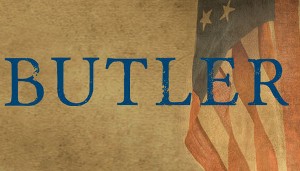 “Butler” by Richard Strand (March 18-April 17, 2016): Early in the Civil War, three escaped slaves arrive at a Union fort to seek sanctuary from Major General Butler. Despite the conflict between the states, law requires that the slaves be returned to their rightful owner. Seeking a solution that satisfies both ethics and duty, Butler embarks on a battle of words and wits, calling into question what is legal versus what is right in a tale based on actual events. “It’s an ironic and funny play about finding a solution to a racial problem through dialogue,” says Jones. “It’s very clever, and based on a true story.
“Butler” by Richard Strand (March 18-April 17, 2016): Early in the Civil War, three escaped slaves arrive at a Union fort to seek sanctuary from Major General Butler. Despite the conflict between the states, law requires that the slaves be returned to their rightful owner. Seeking a solution that satisfies both ethics and duty, Butler embarks on a battle of words and wits, calling into question what is legal versus what is right in a tale based on actual events. “It’s an ironic and funny play about finding a solution to a racial problem through dialogue,” says Jones. “It’s very clever, and based on a true story. “The Gospel According to Thomas Jefferson, Charles Dickens and Count Leo Tolstoy: Discord” by Scott Carter (May 13-June 12, 2016): What do a Founding Father, a Victorian novelist and a Russian revolutionary have in common? Not much, but each of these great minds was once brazen enough to pen his own Gospel. Brought together, they debate the meaning of life and the nature of God in a whip-smart comedy that illuminates the brilliance, flaws and humor of three unforgettable philosophers. “This is a no-holds-barred dialectic among three men in limbo debating their visions of the New Testament,” says Jones. “We have Tolstoy the Eastern Orthodox, the socialist world view of Dickens, and Jefferson the capitalist who owned slaves. It’s a comic debate that starts from general principles but turns personal.”
“The Gospel According to Thomas Jefferson, Charles Dickens and Count Leo Tolstoy: Discord” by Scott Carter (May 13-June 12, 2016): What do a Founding Father, a Victorian novelist and a Russian revolutionary have in common? Not much, but each of these great minds was once brazen enough to pen his own Gospel. Brought together, they debate the meaning of life and the nature of God in a whip-smart comedy that illuminates the brilliance, flaws and humor of three unforgettable philosophers. “This is a no-holds-barred dialectic among three men in limbo debating their visions of the New Testament,” says Jones. “We have Tolstoy the Eastern Orthodox, the socialist world view of Dickens, and Jefferson the capitalist who owned slaves. It’s a comic debate that starts from general principles but turns personal.”
 Getting there:
Getting there:
Northlight Theatre, founded in 1974, led a nomadic life until 1997 when the company settled into its present home, the North Shore Center for the Performing Arts, a 342-seat theater located at 9501 Skokie Blvd. in Skokie, IL. It’s just east of the Edens Expressway, across from Westfield Old Orchard shopping center.
Related Links:
- Official website of Northlight Theatre: Northlight.org
- Review of “Detroit ’67” at Northlight: Read it at ChicagoOntheAisle.com
- Review of “Ten Chimneys” at Northlight: Read it at ChicagoOntheAisle.com
Tags: Bruce Graham, George S. Kaufman, Gloria Allen, Moss Hart, Northlight, Philip Dawkins, Richard Strand, Scott Carter, Terrence McNally


No Comment »
1 Pingbacks »
[…] Preview of Northlight Theatre’s complete 2015-16 season: Read it at ChicagoOntheAisle.com […]